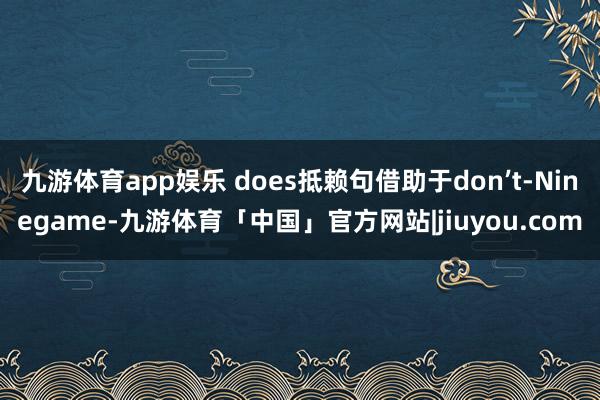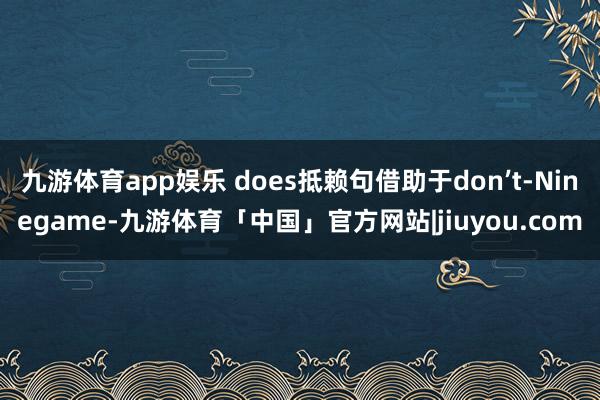
九游体育app娱乐 does抵赖句借助于don’t-Ninegame-九游体育「中国」官方网站|jiuyou.com
新闻动态
小学阶段必备的英语语法学问点,时态九游体育app娱乐,句型,常用词大全,你需要的王人在这! 一 日历的默示法 用the+序数词+ of +月 如:三月三日 the third of March; 12月25日 the 25th of December. both 默示两者王人 如:My parents are both teachers. all默示三者以上王人 如:The students are all very excited. 节日的默示法 有day的节日前用on. 莫得day的节日前
详情

小学阶段必备的英语语法学问点,时态九游体育app娱乐,句型,常用词大全,你需要的王人在这!
一
日历的默示法
用the+序数词+ of +月
如:三月三日 the third of March;
12月25日 the 25th of December.
both 默示两者王人
如:My parents are both teachers.
all默示三者以上王人
如:The students are all very excited.
节日的默示法
有day的节日前用on.
莫得day的节日前用at,
如:at Christmas; on Christmas Day; at New Year; on New Year’s Day.
伸开剩余95%野蛮感奋的
excited默示野蛮的,感奋的主语是东谈主;
exciting默示令东谈主野蛮的,令东谈主感奋的主语是事情
如:The running race is very exciting, so all the students are very excited.
竞走相等令东谈主野蛮,因此扫数的学生王人很野蛮。
相比
两者相比用相比级,三者以上相比用最高等
如:Who runs faster, the boy or the girl? The boy does
谁跑得更快,男孩已经女孩?男孩。
Which season do you like best? I like autumn best.
你最心爱哪个季节?我最心爱秋天。
Which season do you like better, summer or winter? I like winter better.
你更心爱哪个季节,夏天已经冬天?我更心爱冬天。
动词复原的用法
前边用了do, does did, don’t, doesn’t didn’t背面动词要复原。
如:Did she watch TV last night?
Helen doesn’t like taking photos.
到了
到达用get to
但着重到家,到这儿,到那处不不错加to
如:get home; get here; get there,
另外go home; come here; go there也雷同。
长着和穿戴
长着什么用with
如:the girl with big eyes 大眼睛的女孩;
穿戴什么用in
如:the man in black穿黑衣服的男东谈主
或:the woman in the white skirt 穿白色短裙的妇女
让某东谈主作念某事
用let sb后加动词原形
如:Let’s water the flowers together.
是该作念…的技能了用It’s time for+名词或It’s time to +动原。
匡助某东谈主作念某事是help sb with sth
如:帮我学英语是 help me with my English
树上
外来的东西在树上用in the tree
如:the bird in the tree;
树上长的用on the tree
如:the apples on the tree
怒放和乐器
球类之前不加the;
乐器之前必须加the
如:play the piano; play football
二
当今进行时
默示正在发生的事情或进行的动作,常与now,listen,look等词连用,结构是主语+be动词(am, is, are)+动词ing.
如:It is raining now.
外面正不才雨
It is six o’clock now.
当今6点了
My parents are reading newspapers in the sitting room.
我父母正在客厅看报纸
Look! The children are having a running race now.
看!孩子们正在竞走
问句将be动词移前,抵赖句在be动词后+not.
一般当今时
默示时常反复发生的事情或动作,常与often, usually, sometimes, always, every day(week year…) on Sundays等词连用。
结构是主语+动词原形;当主语为第三东谈主称单数即he,she, it, Tom, my mother, the boy等词时,动词后加s或es.
如:We have an English lesson every day.
咱们每天王人要上英语课
Do the boys run faster than the girls? Yes, they do.
男孩比女孩跑的快吗?是的
问句借助于do, does抵赖句借助于don’t, doesn’t,背面动词一定要复原。
一般畴昔时
默示发生在畴昔的事情或存在的状况,常与just now; a moment ago; … ago; yesterday; last ( week; month; year; Monday; weekend); this morning等词连用。
结构是主语+be动词的畴昔式(was; were)或主语+动词的畴昔式。
着重:be动词与动词畴昔式不可同期使用。
如:My earphones were on the ground just now.
我的耳机刚刚还在呢。
Where were you last week? I was at a camp.
你上个星期去哪了?我去野营了
What did you do yesterday? I visited a farm
你昨天去干嘛了?我去参不雅农场了。
问句有be动词将be动词移前,莫得be动词借助于did,背面动词复原;
抵赖句有be动词在背面加not,莫得借助于didn't背面动词复原。
一般畴昔时
默示将要狡计发生的事情或动作,常与tomorrow, next week(year; Tuesday…), this week( weekend ;evening; afternoon;…)today等词连用。结构是主语+be(am, is, are) going to + 动原或主语+will +动原。
如:What are you going to do tomorrow? I am going to have a picnic.
你未来要去干嘛?我要去野餐。
The childre are going to have a sports meeting next week.
孩子们下个星期将插足怒放会。
Tom will/is going to see a play with his father this evening.
Tom今晚将和父母去看上演。
问句将be动词或will移前;抵赖句在be动词或will后加not.
三
花样动词
can; can’t; should; shouldn’t; must; may后一定加动词原形。
如:The girl can’t swim, but she can skate.
女孩不会游水,关联词会溜冰
Don’t talk in class, you should listen to the teacher carefully.
不要在课上谈话,你应该细密听诚恳讲。
祈使句
确定祈使句以动词原形开端;抵赖祈使句以don’t加动词原形开端。
如:Open the box for me ,please.
请为我掀开盒子。
Liu Tao! Please get up earlier tomorrow.
刘涛,未来请早点起床!
Don’t walk on the grass!
不要在草地上走!
Helen! Don’t climb the tree,please.
海伦!不要爬树。
go的用法
去干嘛用go +动词ing
如: go swimming; go fishing;
go skating;
go camping;
go running;
go skiing;
go rowing…
相比
than 前用相比级;as…as之间用原级。
如:My mother is two years younger than my father.
我妈比我爸年青两岁。
Liu Tao jumps as far as Ben.
刘涛跳得和本雷同远。
心爱作念某事
用like +动词ing或like+ to + 动原。
如:Su Yang likes growing flowers.
苏阳心爱种花。
The children like to play with lanterns at Spring Festival.
孩子们心爱在春节去玩花灯。
念念要作念某事
用 would like +to+动原或want + to +动原。
例:I’d like to visit the History Museum.=I want to visit the History Museum
some
用于确定句中,在抵赖句和问句中改为any,但当默示委婉口吻时仍用
如:Can I have some writing paper? Would you like some orange juice?
代词
东谈主称代词主格作念主语用一般放在句首或动词前,主格折柳是 I you he she it we you they。
宾格作念宾语用,一般放在动词或介词后
如:Open them for me. Let us …, join me等。
宾格折柳是me you him her it us you them。
形色词性物主代词放在名词前,不行单独使用,折柳是my your his her its our your their
名词性物主代词非凡于形物加名词,它只可单独使用背面不好加名词,折柳是mine yours his hers its ours yours theirs。
四
介词
介词后要么不加动词,加动词只可加动词ing样式
如:be good at running;
do well in jumping;
技能介词
季节前,月份前用介词in
如:in summer;in March
具体的哪一天如星期几,几月几日用介词on
如:on Saturday; on the second of April; on Wednesday morning
在几点钟前用介词at
如:at a quarter to four;
只在高低午晚上用in
如:in the morning/ afternoon/ evening;
但在夜间用at night。
另:季节,月份和星期前不好加the.
名词复数组成的阵势
有规矩的有:
(1)平直在名词后加s
如orange—oranges; photo—photos;
(2) 以x, s, sh, ch 扫尾的加es
如:box—boxes; glass—glasses; waitress—waitresses; watch—watches;peach--peaches
(3) 以子音字母加y扫尾的改y为i加es
如:study—studies;library—libraries; hobby—hobbies; family—families;
(4)以f, fe扫尾的改f, fe 为v+es如:knife—knives; thief—thieves(注:以o扫尾的咱们学过的只消mango加es, mango—mangoes其余加s,)
不规矩的有:
man—men; woman—women; people—people; child—children
动词第三东谈主称单数的组成
(1)平直在动词后加s
如:run—runs; dance—dances
(2)以s,sh,ch,o扫尾的加es
如:do—does;go—goes;wash—washes;catch—catches
(3)以子音字母加y扫尾的改y为i加es
如:study—studies; carry—carries;
当今分词的组成
(1)平直在动词后加ing
如:sing—singing; ski—skiing;
(2)双写词尾加ing
如:swim—swimming; jog—jogging;run—running;
(3)以不发音的e扫尾的去e加ing
如:ride—riding; dance—dancing; make—making;
规矩动词畴昔式的组成
(1)平直在动词后加ed
如:clean—cleaned; milk—milked; play—played;
(2)以e扫尾的平直加d
如:dance—danced; taste—tasted;
(3) 以子音字母加y扫尾的改y为i加ed
如:study—studied;carry—carried;
(4)双写词尾加ed
如:stop—stopped; jog—jogged;
不规矩的有:am,is—was; are—were; do,does—did; have,has—had; go—went; meet—met; sit—sat; see—saw; get—got; tell—told; run—ran; come—came; steal—stole; read—read;
形色词副词相比级的组成
规矩的:
(1)平直在形色词或副词后加er
如;small—smaller; low—lower;
(2)以e扫尾的加r
如:late—larer;
(3)双写词尾加er
如:big—bigger; thin—thinner; fat—fatter;
(4) 以子音字母加y扫尾的改y为i加er
如:heavy—heavier; early—earlier;
不规矩的有:
good, well—better(最高等为best); many, much--- more(最高等为most); far---farther;
五
rain与snow的用法
(1)动作名词真谛是雨水和雪是不可数名词
如:There is a lot of rain there in spring. 那处的春天有好多雨水。
(2) 动作动词真谛是下雨和下雪,有四种样式折柳是:
动词原形rain, snow;
第三东谈主称单数rains ,snows;
当今分词raining;snowing
畴昔式rained;snowed;
如:①Look! It is raining now. 瞧!天正不才雨。
②It often rains in Nantong in summer.南通夏天时常下雨。
③ It rained yesterday.昨寰宇了雨。
④It is going to rain tomorrow. 未来要下雨。
(3)形色词为rainy 和snowy 真谛是有雨的和有雪的
如:It is often rainy here in spring.这儿的春天时常是有雨的。
If it is rainy tomorrow, I’ll stay at home.如若未来是有雨的,我将呆在家里。
相比级
着重只消同类事物才可进行相比。
如:My eyes are bigger than hers.Your school bag is heavier than mine. My computer is nicer than Nancy’s. My brother is stronger than me.
have, has
默示某东谈主有(has用于第三东谈主称单数);There is/ are;
There was/ were 默示某地存在有
着重There be 句型的就近原则
单数或不可数用there is /was;
复数用there are/ were.
本人即是复数的词
眼镜glasses; 耳机earphones; 鞋shoes;裤子trousers等词本人是复数。
如:My glasses were on the chair just now.
但如若默示这双,这副,一对的技能用单数
如:There is a pair of chopsticks on the plate. This pair of earphones is for you.
五个元音字母折柳是Aa, Ee, Ii, Oo, Uu;
一个的用法
a用于子音前不是子音字母前;an 用于元音前不是元音字母前。
如:There is an ’s’, a ‘t’, a ‘u’, a ‘d’ ,an ‘e’, an ‘n’,and a ‘t’ in the word ‘student’.
技能默示法
有两种:
(1)平直读时钟和分钟。
如6:10读成 six ten; 7:30读成seven thirty; 8:45读成eight forty-five;
(2)用to与past默示。
在半小时包括半小时以内用几分past几点
如:6:10读成ten past six; 7:30读成half past seven;
过了半小时用下一个钟点差几分
如7:45读成a quarter to eight; 9:50读成ten to ten;
基数词变序数词的阵势
基变序有轨则,扫尾加上th; 一二三相当例,扫尾字母t、d(即first, second, third);
八去t, 九去e, ve要用f替(即eigh—eighth; nine—ninth; five-- fifth ;twelve—twelfth);
ty改y为ie后加th别健忘(即整十数如twenty—twentieth;forty—fortieth);
几十几十位为基个位为序(如第二十一为twenty-first)。
另外强调序数词前一定要加the。
来源 | 小学英语学习指南
明师俱乐部进行裁剪整理,版权归原作家扫数,如有侵权商量删除
明师投稿箱
迎接您把我方的英语教学训诫阵势、优质教学遐想案例、教授心得等和人人共享,可成为明师海外教授计划院的签约作家,更有契机被收录到《明师说》系列谨慎出书,与40万英语教师共同特出,快来投稿吧!
投稿邮箱:mingshijiaoyanbu@163.com,邮件定名为“投稿+作家姓名+手机号”
教学资源、精彩行为、情理互动
福利扣头、在线商议
湖南、福建、川渝、浙江
山东、江苏、安徽、江西
北京、上海
山西、河北
河南、天津
湖北、广东
陕西、内蒙
其他地区
请按地区添加明诚恳九游体育app娱乐, 不要近似添加



